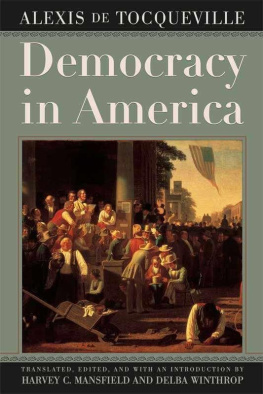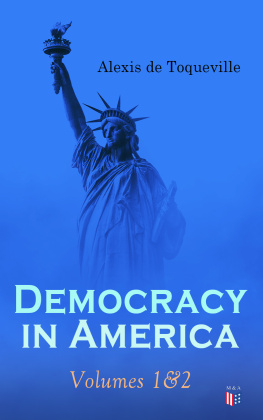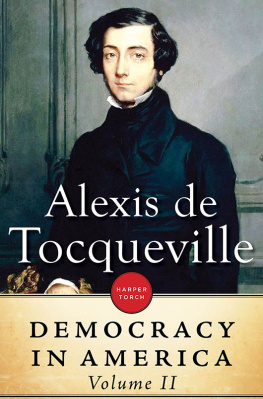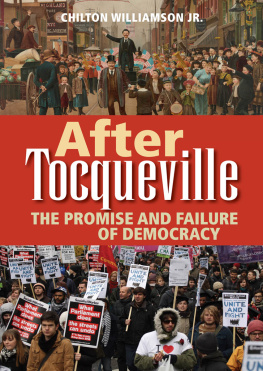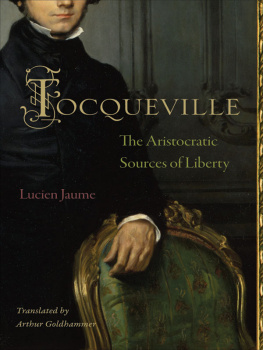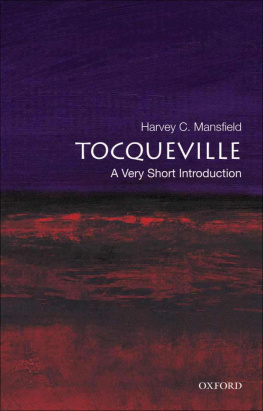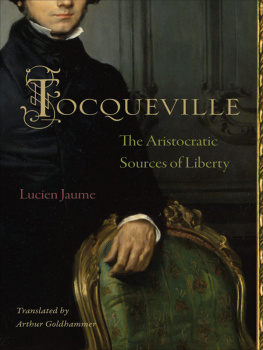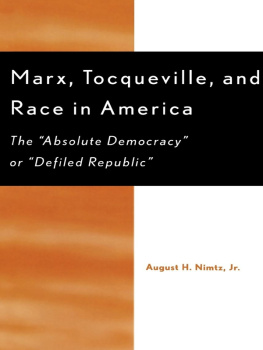Tocqueville - Democracy in America
Here you can read online Tocqueville - Democracy in America full text of the book (entire story) in english for free. Download pdf and epub, get meaning, cover and reviews about this ebook. year: 2011, publisher: Chicago University Press, genre: Science. Description of the work, (preface) as well as reviews are available. Best literature library LitArk.com created for fans of good reading and offers a wide selection of genres:
Romance novel
Science fiction
Adventure
Detective
Science
History
Home and family
Prose
Art
Politics
Computer
Non-fiction
Religion
Business
Children
Humor
Choose a favorite category and find really read worthwhile books. Enjoy immersion in the world of imagination, feel the emotions of the characters or learn something new for yourself, make an fascinating discovery.
- Book:Democracy in America
- Author:
- Publisher:Chicago University Press
- Genre:
- Year:2011
- Rating:5 / 5
- Favourites:Add to favourites
- Your mark:
- 100
- 1
- 2
- 3
- 4
- 5
Democracy in America: summary, description and annotation
We offer to read an annotation, description, summary or preface (depends on what the author of the book "Democracy in America" wrote himself). If you haven't found the necessary information about the book — write in the comments, we will try to find it.
Democracy in America — read online for free the complete book (whole text) full work
Below is the text of the book, divided by pages. System saving the place of the last page read, allows you to conveniently read the book "Democracy in America" online for free, without having to search again every time where you left off. Put a bookmark, and you can go to the page where you finished reading at any time.
Font size:
Interval:
Bookmark:
THE UNIVERSITY OF CHICAGO PRESS, CHICAGO 60637
THE UNIVERSITY OF CHICAGO PRESS, LTD., LONDON
2000 BY THE UNIVERSITY OF CHICAGO
ALL RIGHTS RESERVED. PUBLISHED 2000
PAPERBACK EDITION 2002
PRINTED IN THE UNITED STATES OF AMERICA
15 14 13 12 11 10 09 08 07 11 12 13 14
ISBN: 0226-805328 (CLOTH)
ISBN: 0226-805360 (PAPER)
ISBN: 9780226924564 (E-BOOK)
LIBRARY OF CONGRESS CATALOGING-IN-PUBLICATION DATA
TOCQUEVILLE, ALEXIS DE, 18051859.
[DE LA DMOCRATIE EN AMRIQUE. ENGLISH]
DEMOCRACY IN AMERICA / TRANSLATED, EDITED, AND WITH AN
INTRODUCTION BY HARVEY C. MANSFIELD AND DELBA WINTHROP.
P. CM.
INCLUDES BIBLIOGRAPHICAL REFERENCES AND INDEX.
ISBN 0-226-80532-8 (HARDCOVER)
1. UNITED STATESPOLITICS AND GOVERNMENT. 2. UNITED STATESSOCIAL CONDITIONS. 3. DEMOCRACYUNITED STATES. I. MANSFIELD, HARVEY CLAFLIN, 1932 II. WINTHROP, DELBA. III. TITLE.
JK216 .T713 2000B
320.473DC21
00-008418
 THE PAPER USED IN THIS PUBLICATION MEETS THE MINIMUM REQUIREMENTS OF THE AMERICAN NATIONAL STANDARD FOR INFORMATION SCIENCESPERMANENCE OF PAPER FOR PRINTED LIBRARY MATERIALS, ANSI Z39.481992.
THE PAPER USED IN THIS PUBLICATION MEETS THE MINIMUM REQUIREMENTS OF THE AMERICAN NATIONAL STANDARD FOR INFORMATION SCIENCESPERMANENCE OF PAPER FOR PRINTED LIBRARY MATERIALS, ANSI Z39.481992.
Alexis de Tocqueville
TRANSLATED, EDITED, AND WITH AN INTRODUCTION BY
HARVEY C. MANSFIELD AND DELBA WINTHROP
THE UNIVERSITY OF CHICAGO PRESS CHICAGO AND LONDON

Map of the United States appearing in the first edition of Democracy in America (1835). Courtesy of the Department of Special Collections, Joseph Regenstein Library, University of Chicago.
Harvey C. Mansfield and Delba Winthrop
Democracy in America is at once the best book ever written on democracy and the best book ever written on America. Tocqueville connects the two subjects in his Introduction, and in his title, by observing that America is the land of democracy. It is the country where democracy is least hindered and most perfected, where democracy is at its most characteristic and at its best. Today that claim might be contested, but it is at least arguable. If the twentieth century has been an American century, it is because the work of Americanot altogether unsuccessfulhas been to keep democracy strong where it is alive and to promote it where it is weak or nonexistent. Somehow, after 165 years, democracy is still in America.
Tocqueville went to America, he said, to see what a great republic was like, and what struck him most was its equality of conditions, its democracy . Long ago began a democratic revolution, and it continues today, gathering speed as resistance to it declines. He sets forth the point of departure in Puritan America and the origin of self-government in the towns of New England. He analyzes the federal constitution that was meant to facilitate democratic self-government and keep it moderate. He shows that the people are sovereign, whether through the Constitution or despite it, and he warns of the tyranny of the majority. In the very long last chapter of the first volume he examines aspects of American democracy peculiar to America, especially the juxtaposition of the three races there, and he speculates about what these portend for Americas future.
In the second volume Tocqueville turns the argument from the natural rise of democracy in America to the influence of democracy on America, beginning with its intellectual movements. Americans have a philosopher unknown to themDescarteswhose precepts they follow and whose books they never read. Descartes endorses their reliance on their own judgment, which tells them they can do without his help. Americans suffer, consequently, from individualism, a lamentable conditionwhich Tocqueville was the first to depictin which democratic men and women are thrown on their own resources and consequently come to feel themselves overpowered by impersonal, external forces. But individualism is not the fated consequence of democracy: there are remedies against it, above all the capability of Americans to associate with one another voluntarily in accordance with their own will and reason instead of relying on a centralized, schoolmaster government to take care of them. Tocqueville dubs this government an immense being and says that it brings on a mild despotism, which he describes with uncomfortably accurate foresight. To these few highlights one might easily add others, but let these suffice for a welcome to this marvelous work.
Tocquevilles book has acquired the authority of a classic. It is cited with approval by politiciansby all American presidents since Eisenhoweras well as by professors in many fields. Universal accord in its praise suggests that it has something for everyone. But it also suggests that readers tolerate, or perhaps simply overlook, the less welcome passages that their political and scholarly opponents are citing. It is quite striking that both Left and Right appeal to Democracy in America for support of their contrary policies. Tocqueville seems to have achieved the goal, expressed at the end of his Introduction, of standing above the parties of the day. Yet his widespread appeal should not mask the controversial and unsettling character of the work.
When Tocqueville wrote his book, it was to speak reprovingly, and sometimes severely, to the partisans of his day for and against democracy. Although the Old Regime has now faded into unremembered history and everyone has followed Tocquevilles advice to accept democracy, partisans remain within it, and they still divide over whether to restrain democracy or push it further. Tocqueville has something dismaying, but instructive, to say to both parties. He knows the extent of democracy in America because he sees better than we the resistances to it in America. He came to America to examine democracy up close and to be sure of what he thought he might find. Unlike other visitors he knew that America was not merely derivative of Europe. It was not behind but ahead of Europe and in that sense exceptional. Tocqueville takes the measure of Americas boast, repeated on the first page of The Federalist , to set an example for all mankind. He makes his ambition the study of Americas ambition, in both cases an ambition that leaves others free. It is open to any country to surpass America if it can, and it is possible that some writer, some day, will write a better book on democracy in America than this one.
Before we survey the marvels of Democracy in America and the difficulties of interpreting what it means, let us look at Tocqueville the man to see from whence he came, the conditions of life imposed on him, and the influences he chose to accept.
Alexis de Tocqueville was born on July 29, 1805, and died in his fifty-fourth year on April 16, 1859: not a long life, and one often afflicted with ill health. He was born a French aristocrat and lived as one; and he was also a liberal who both rejected the old regime of aristocracy and doubted the revolution that overturned it. An aristocratic liberal he was, and if we knew everything contained in that difficult combination, we could stop here. But since we do not, the formula will serve as a beginning. In thought as in life Tocqueville always held to freedom and to nobility, and his question, his concern was how to keep them together.
Tocqueville was born into a very old Norman family named Clrel; one of his ancestors had fought in the company of William the Conqueror at the Battle of Hastings. Through marriage, negotiation and action at law, the Clrels acquired the fief of Tocqueville in Normandy, and in 1661 took that name. Alexiss grandfather was a chevalier; his father Herv became a count in 1820. In 1793 Herv had married the granddaughter of Malesherbes, a great figure late in the Old Regime: botanist, correspondent of Jean-Jacques Rousseau, both minister and critic of Louis XVI, and courageous defender of the king at his trial in 17921793. Malesherbes and Herv de Tocqueville were imprisoned during the Terror, the former guillotined together with a sister, a daughter, a son-in-law, and a granddaughter and her husband. Herv was spared and released in 1794, his hair having turned snow white at the age of twenty-two. Herv became the guardian of the two orphans of Malesherbess son-in-law, who was the elder brother of the great writer Franois-Ren de Chateaubriand. In his Memoirs Chateaubriand speaks of seeing his nephews growing up with Alexis, future author of Democracy in America . He remarks in one of his epigrams: Alexis de Tocqueville went through civilized America while I visited its forests. However sharp his sympathetic appreciation for aristocratic societyand it was considerablethis was not a man of aristocratic feeling, ready to make sacrifices as pre de famille on behalf of aristocratic illusions.
Next pageFont size:
Interval:
Bookmark:
Similar books «Democracy in America»
Look at similar books to Democracy in America. We have selected literature similar in name and meaning in the hope of providing readers with more options to find new, interesting, not yet read works.
Discussion, reviews of the book Democracy in America and just readers' own opinions. Leave your comments, write what you think about the work, its meaning or the main characters. Specify what exactly you liked and what you didn't like, and why you think so.

